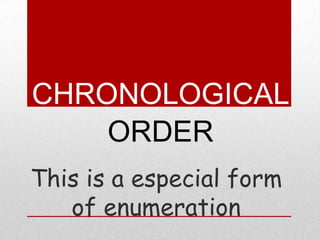Chronological Order
- 1. CHRONOLOGICALORDERThis is a especial form of enumeration
- 2. IMPORTANT POINTS.All kind of TIMES CLUES are use in chronological order.Yesterday; simple past   Every day;simple presentTomorrow;simple future  While; past progressiveNow;present progressive.PREPOSITIONAL PHRASES OF TIME,often appear. Eg; He got a raise atthe beginning of the day.
- 3. LISTING SIGNALSEnumerators are rarelyused in chronologicalorder. Wemightocaccionallywriteâthenextthingâor âthe nexteventâWhenmaking a list.Peopleoften use numerals (eg: 1,2,3). In most informal writing, however, a list is usuallynotmadewithnumerals,theitems are indicatedbywhatwecalllistingsignals. Some are; first, second, third.
- 5. ANALYSIS (âTime lineâ) exerciseModel ParagraphAlthough the U. S. Air Force was not officially created until after theSecond World War, it had existed under other names since the beginning of the century. The Army Air Forces were started on August 1,1907, as a part of the Aeronautical Division of the U,S. Signal Corps, andit was more than one year later that this small division carried out its firstmission in its own airplane. When the United States entered WorldWar I in 1917, the Aviation Service, as it was then called, had only thirty fivepilots. On December 7, 1941, the renamed Army Air Forces hadonly three thousand of their ten thousand planes ready for combat.Finally, in 1947, the U. S. Air Force was established as a separate branchof the military.
- 7. TIME CLUESTimes clues of allkinds are, of course, veryoftenused in chronology,. Once again,however, as withlistingsignals, the form of verb are notgenerally present form, as theywere in process, butrather past form.
- 9. Nowaskyourself.Whichpreposition of time are use with the following:Days of week?
- 10. Months of the year?
- 11. An exact date?
- 12. Parts of the day? (twopreposition)
- 13. A specificyear?
- 14. A particular hour of the day?
- 15. Oh Sorry! ïWehavenotfinishedyetâĶBest comes now!!!










